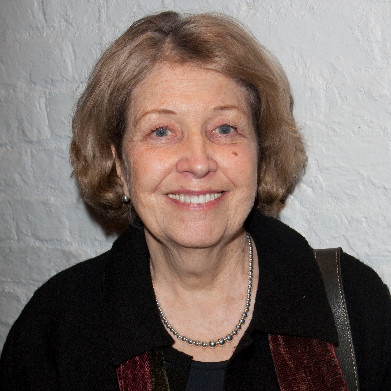Michael Coveney: Surprise moves by Anne Reid in cabaret, Tessa Ross at the National
Michael Coveney visited the Crazy Coqs to see Anne Reid, and also discusses the appointment of Tessa Ross as the National’s new executive director

© Dan Wooller
The latest quirky turn at the Crazy Coqs, on a second visit, is the wonderful actress Anne Reid, someone who always surprises and delights in equal measure, whatever she does. At a mere 78 years young, ten years junior to Angela Lansbury, currently leading the geriatric charge on the West End stage in Blithe Spirit, Reid has lately taken to performing a cabaret.
This act, In a New Key, includes rare songs by Stephen Sondheim – "In No Time At All" from Saturday Night, "Sand" from the unproduced Singing Out Loud (1992) and the beautiful "I Wouldn't Change a Thing" from the equally unproduced Last Resorts (1956) – as well as items by Jerry Herman, Billy Joel, Cy Coleman and Carolyn Leigh, and Don McLean's "Addicted to Black", which might or might not have been aimed at lyricist Don Black, who was enjoying the show in the company of his wife, Shirley, agent Jackie Gill, actor Denis Lawson and Really Useful executive Mark Fox.
Reid's latest television role was in Last Tango in Halifax, opposite Derek Jacobi, but she's still remembered as Valerie Barlow in Coronation Street (electrocuted with a hair-dryer she was, poor love) and Jean in Victoria Wood's Dinnerladies. On stage in the past ten years she's adorned Peter Gill's The York Realist, John Osborne's Epitaph for George Dillon and the Old Vic Hedda Gabler with Sheridan Smith.
Most surprising of all, though, was her performance in Roger Michell's movie The Mother (2003), scripted by Hanif Kureishi, in which she struck a memorable blow for senior sex when, playing Daniel Craig's girlfriend's mother, she was gloriously and graphically ravaged from behind by the future James Bond himself.
It was all nice and calm in the Crazy Coqs, though, as she picked her way carefully and perfectly through her songs, not tearing the place up or trying to emulate people who do this sort of thing for a living, just sharing her pleasure in good music and literate, civilsed lyrics. And that was enough.
All her fantasies as a child, she said, were of singing. It was as simple as that. And so, with expert piano accompaniment from Stuart Hutchinson, that is what she did. It was like sitting in someone's front room and discovering that your favourite auntie had been quietly polishing her act, along with the family silver, for years without anyone knowing.
The place was heaving last night. On my way in, I bumped into Scarlett Strallen, who was having dinner in the Brasserie Zedel next door. She told me she’s on her way to New York to play Lady Macduff in Kenneth Branagh's Macbeth, a revival of the great production he put on for the Manchester International Festival last year.
This news was almost as surprising as some of Anne Reid's songs. Or indeed this week's announcement of the new executive director of the National Theatre. Nick Starr will be succeeded in September by Tessa Ross, 53, currently controller of film and drama at Channel 4, and the driving force behind such big recent movies as Danny Boyle's Slumdog Millionaire, Kevin Macdonald's The Last King of Scotland, Steve McQueen's Oscar-winning 12 Years a Slave and Mike Leigh's upcoming Mr Turner.
Although she has been an external member of the NT board for three years, her background – after taking a degree in Oriental Studies at Oxford – is entirely in film and television. It's hard to see how she could make any sort of theatrical contribution to Rufus Norris's new regime similar to that of Nick Starr's to Nicholas Hytner's; Starr steered Hytner towards Tom Morris and the BAC crowd, and many other fringe operators who are now regular employees at the National.
But maybe that doesn't matter, and Ross's obvious artistic acumen and organisational skills – the tributes paid to her online this week have all been overwhelmingly, almost embarrassingly, positive – will kick in in other ways. Her appointment is certainly a brave one and, as a former head of drama at BBC Television, too, she's certainly well placed in the new media establishment of writers and directors. And she's a member of the Groucho Club.
Ironically, her predecessor as head of film at Channel 4, David Aukin, took that job after he left the National as Richard Eyre's first choice as executive director, having made a notable administrative success at both the Hampstead Theatre and Leicester Haymarket (in pre-Curve days).
But Aukin, like his pre-Nick Starr successor, Genista McIntosh, was steeped in theatre all his professional life, producing the People Show from the late 1960s onwards, and brokering the London visits of New York experimental companies such as Joe Chaikin's Open Theatre, as well as the plays of Sam Shepard.
I'm sure Tessa Ross will be good at her job, but it will be especially interesting to see what she brings to the top table, creatively; perhaps she will be revealed as a great purveyor of the classic repertoire, something Rufus Norris has openly admitted he needs help with, and arguably the weakest part of the Hytner regime.












